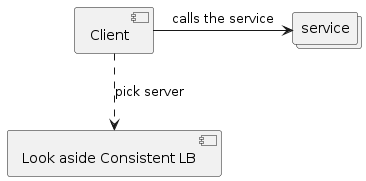This project is a sample proof of concept on using consistent hash as a load balancer.
This uses the awesome projects from consistent-hash from buraksezer/consistent and gofiber to serve endpoints.
This project is a simple implementation of a look aside load balancer using consistent hash.

Our use case is to be able to route a key to a particular node in order to make use of the local cache held in that node. The process that needs to be performed by this node for this particular key must be in order.
As an example: Calculating an account balance
Using Consistent hash, we can direct the request from an account number to a specific node.
First update the list of cluster members, an example is here
infrastructure:
nodes:
- name: localhost:10001
- name: localhost:10002
- name: localhost:10003
- name: localhost:10004
- name: localhost:10005
- name: localhost:10006
- name: localhost:10007
- name: localhost:10008
- name: localhost:10009
- name: localhost:10010When you boostrap the consistent hash, it will automatically populate the hash ring with these members.
./consistent-demo balancer --config ./hack/config.yamlPick the member
curl http://localhost:3000/pick/12345This will return a json
{"previousNode":"","currentNode":"localhost:10003"}The previousNode is to help the participating service to determine if the request was previously handled by it.
This can be very useful to tell the service that please refresh you local cache, since the previous request was not sent to you.
The client code can now use the currentNode to send its request to.
Say you want to add a node localhost:9999 as a member.
curl --location --request POST 'http://localhost:3000/node/' --form 'node="localhost:9999"'Say you want to remove the node localhost:9999 from membership. Example, the node was taken down for service.
curl --location --request DELETE 'http://localhost:3000/node/' --form 'node="localhost:9999"'The look aside load balancer frees the load balancer from proxying the request to the intended service. This can be kept really light and should be able to serve plenty of requests.
There is an accompanying simple service which doesn't do much, except print out whether the previousNode is the same as the currentNode
To use it.
./consistent-demo simple --port 10000The consistent hash balancer regularly performs health checks based on the list of members defined in the config.yaml
If it cannot reach the member, it will remove it from the consistent hash. When it comes back online, it will add the node back to the hash.
The health check is dont every 200ms.
To get the partition distribution for each node
curl --location --request GET 'http://localhost:3000/list'Will return you the following:
{
"localhost:10000": 5,
"localhost:10001": 5,
"localhost:10002": 6,
"localhost:10003": 7,
"localhost:10005": 6,
"localhost:10006": 4,
"localhost:10007": 5,
"localhost:10008": 2,
"localhost:10009": 7,
"localhost:10010": 3
}